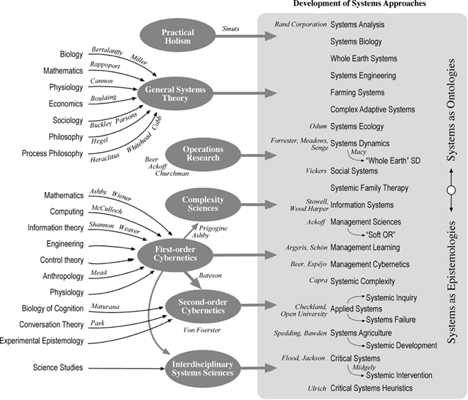1 The development of systems approaches
Many well-known systems thinkers also had particular experiences, which led them to devote their lives to their particular forms of systems practice. So, within systems thinking and practice there are different traditions, which are perpetuated through lineages (see Figure 1). Some of these key systems thinkers mentioned in Figure 1 developed their forms of practice in terms of developing (and having their name associated with) formalised systems or systems-related approaches or methods, a topic you will be looking at again in more detail in Week 7.
Activity 1 Systems approaches – an overview
- Identify those blobs or phrases in Figure 1 which you have heard of or with which you are familiar. If you would find it helpful, list them in the box below.

A larger version of Figure 1 is also available in PDF format: Week 6, Figure 1 [Tip: hold Ctrl and click a link to open it in a new tab. (Hide tip)] .
- Do a web search and bookmark some sites which relate to those blobs you have not heard about. Use any search engine to do this perhaps starting with the words or people named in Figure 1 as keywords.
There are too many names and traditions shown in Figure 1 to cover in any detail in this open course so you will concentrate on five systems thinkers because of the range of perspectives they have brought to system thinking in practice – Jay Forrester, Stafford Beer, Geoffrey Vickers, Peter Checkland and Russell Ackoff.
You will look briefly at each one and in three cases you can listen to them talking about their work. But if you are interested in following up in much greater detail on systems thinkers beyond what is covered here and what you found in your web search then you should consult the book Systems Thinkers by Ramage and Shipp (2009) which covers 30 people who have been influential in the field.
The five systems thinkers who you are introduced to here have been chosen on the basis of their interdisciplinary biographies and because they variously cover the three broad aspects of systems thinking in practice that you were introduced to in Week 1 – understanding inter-relationships, engaging with multiple perspectives and reflecting on boundary judgements. Thus Forrester and Beer focus on capturing inter-relationships; Vickers (and Checkland) on values and engaging with multiple perspectives and Checkland and Ackoff in boundary reflections and managing. Between them they represent the richness of traditions and histories that inform systems thinking in practice and also the four balls of the juggler you were introduced to in Week 1.
